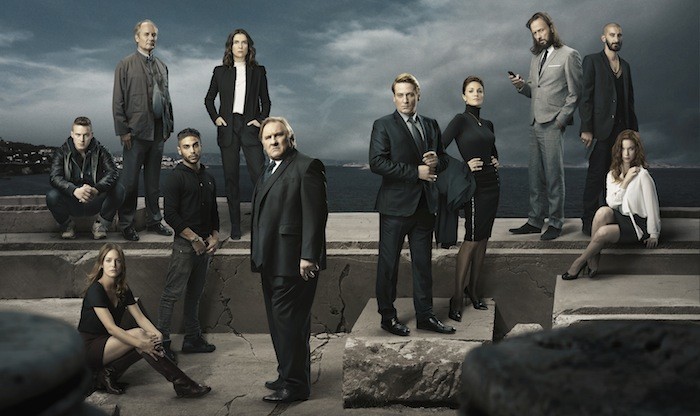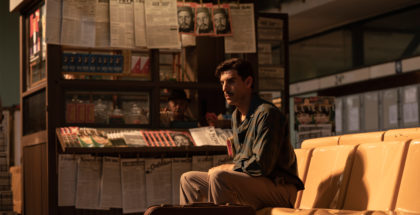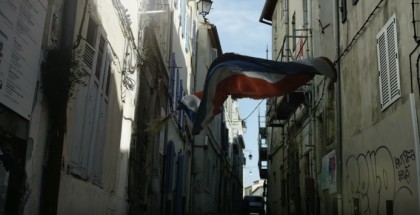Netflix UK TV review: Marseille Season 1 (Episodes 5 to 8)
Review Overview
Cast
5Direction
2Dialogue
2David Farnor | On 22, May 2016
Warning: This contains spoilers – if you haven’t seen Episodes 1 to 4 of Marseille, read our spoiler-free review here.
Marseille is Netflix’s first French original series. It also holds the more dubious honour of being a TV show that gets worse as it goes on.
What started out as mildly disappointing in Marseille’s first four episodes has grown and matured over Season 1’s second half into something truly naff, ridiculously overblown and ripe for mocking laughter. After four episodes of playing up the father-son dynamic of Taro (Gerard Depardieu) and his revolting protegee, Barres (Benoit Magimel), Episode 5 confirms that they really are father and son – the kind of twist that perfectly sums up the show’s total lack of subtlety. This is a series where metaphors and symbols are taken literally: one hilarious moment in Barres’ office sees him staring angrily at a plaster-cast model of Taro’s face, before knocking it off the table, just in case we didn’t get the fact that he doesn’t like him very much.
“Power is not given, it’s taken,” Lucas recites in voice-over during Episode 6, as he stares angrily out of a car window – because Marseille not only doesn’t its own script to mine its drama for nuance, but also doesn’t trust its audience to remember something that was said an hour earlier. He goes on to say the line at least once more in Season 1’s closing chapters, and that constant overstating completely undermines any chance of us engaging with Lucas’ motivations, let alone annoys the heck out of us.
His assistant, Barbara, fares no better, after flirting with Lucas in his office, before ultimately snapping with arguably the most melodramatic speech in the whole season. Taro’s daughter, Julia (Bab’s roommate), meanwhile, rushes to see her criminally connected boyfriend, who has been stabbed over his supporting of Taro rather than Lucas, only for us to realise that we don’t care at all. The fact that this is meant to be a cliffhanger only emphasises the lack of tension or interest conjured up by most characters in the show.
There’s a distinct lack of consequences running throughout – the boyfriend’s fate has little impact on the rest of the narrative, while talk of boarding up voting stations proves equally insignificant (Marseille is right to be annoyed by the portrayal of its underbelly: it looks dead boring from here). Lucas, who is meant to appear morally ambiguous because he genuinely wants to help the youngsters he’s mobilising out in the streets, frames Taro for an expenses scandal, as the election battle enters the second round – but Robert brushes it off with barely a shrug.
Such shades of grey are lost in the show’s slick surface, as we’re treated to a parade of bad editing and storytelling. Those tilting aerial cutaways that were, at first, distinctive, prove increasingly distracting, interrupting the cast at seemingly random moments – a tic made worse by Jean-Pascal Beintus’ music, which becomes louder and more frantic the less gripping the programme gets.
The writers try to weave an intricate ensemble of supporting faces, but they fall at most hurdles – a trip by wannabe journalist Julia to find out about Lucas’ mum (and how he was brought up obsessed with revenge against Robert) doesn’t seem to dissuade her from her crush on Barres, despite its incestuous connotations. (The fact that all the gangsters swagger about the town without any concern for being exposed suggests that Julia’s competence as a reporter is par for the course in France.) We soon discover, meanwhile, that the editor of her newspaper is Taro’s brother – is anyone not related in Marseille? What is this, House Lannister?
To its credit, there are two big surprises up the show’s sleeves that genuinely subvert our expectations: Taro’s wife, Rachel (Géraldine Pailhas), clambers on to a balcony ledge and throws herself off in Episode 7. But even that moment is soon revealed to be just as trivial as the rest of it: she survives, which, on the bad side, means that we still have her stirring up the soap opera soup, but at least means we’re spared further scenes of her miming playing the cello to CD recordings. Later, Taro lies about his wife’s survival to Barres in an attempt to win sympathy voters – a move that Depardieu could have played for enjoyable cunning, but only serves to cut short the televised debate between Taro and Barres that has been built up to for eight episodes. “You’re going to the debate?” asks Julia before he heads to the studio. “I’m going to kill him,” comes the reply – only for it never to come to pass. (One of the rare times that you wish Marseille was more literal in its dialogue.)
It all climaxes, instead, with a loop back to the opening scene of Robert Taro snorting cocaine at Marseille’s football stadium, just as the team go on to win the match and Robert goes on to victory in the election. Then, he has a heart attack in Lucas’ arms – an Oedipal portrait that might have carried some weight, if we hadn’t had Oedipus shoved down our throats for hours. It should be a striking, stunning finale to leave us hankering for what happens next. In reality, it’s a reminder of how much potential has been wasted over Marseille’s eight instalments – imagine how much more interesting the programme might have been if it started with this, or if it took place in the second episode? Will Taro die? Will Barres then take over his place? Will anyone actually bother to tune in to find out in the future? All we can hope for is that it turns out not to be a heart attack, but some infectious disease that spreads through the whole town and wipes out everyone. Now that’s something that really would get our vote.
Marseille: Season 1 is available on Netflix UK, as part of an £9.99 monthly subscription.




















